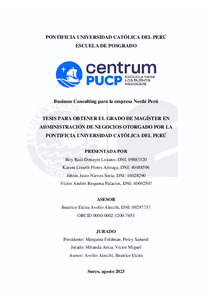| dc.contributor.advisor | Avolio Alecchi, Beatrice Elcira | |
| dc.contributor.author | Donayre Lozano, Roy Raúl | |
| dc.contributor.author | Flores Arteaga, Karem Lisseth | |
| dc.contributor.author | Nieves Soria, Juhins Justo | |
| dc.contributor.author | Requena Palacios, Víctor Andrés | |
| dc.date.accessioned | 2023-09-14T21:33:19Z | |
| dc.date.available | 2023-09-14T21:33:19Z | |
| dc.date.created | 2023 | |
| dc.date.issued | 2023-09-14 | |
| dc.identifier.uri | http://hdl.handle.net/20.500.12404/25956 | |
| dc.description.abstract | El panorama global está caracterizado por un crecimiento lento pero progresivo de la
economía y el uso acelerado de la tecnología de la industria 4.0, transformando al entorno
empresarial con procesos ágiles y eficientes en busca de la creación y retención de valor para
los stakeholders. En ese contexto, Nestlé Perú compite en la industria de consumo masivo de
alimentos, alineando sus procesos con tecnología e innovación, pero se pierde en su canal
tradicional ya que existen ineficiencias originadas por la ausencia de sistemas integrados de
gestión y control logístico con el Socio Comercial Mayorista. Ante esa situación se
plantearon las siguientes interrogantes: ¿cómo mejorar las condiciones del canal tradicional
mayorista para generar eficiencia, sostenibilidad y rentabilidad? y ¿cuál será el modelo de
negocio óptimo para el canal?
La solución consiste en aprovechar los beneficios del Socio Comercial Mayorista en
cuanto a la venta, distribución y obtención de información. Para ello se plantearon dos
estrategias relacionadas con la gestión de la operación a través de un modelo de negocio
centrado en el cliente y la implementación de un sistema integrado que lo conecte con dichos
mayoristas. Con ello se alcanzará un mayor valor para el canal.
El modelo de negocio 2.0 es una propuesta deseable para Nestlé y sus Socios
Comerciales Mayoristas porque mitiga las ineficiencias, a través de la visibilidad y control de
los procesos. Es factible porque se ajusta a la realidad del entorno, las actividades, la
capacidad, los recursos y socios claves. Es viable porque genera un margen financiero
positivo reflejado en el VAN y la rentabilidad del proyecto. Es adaptable porque exige una
revisión constante que permita el desarrollo iterativo y flexible del modelo a los cambios del
entorno. Finalmente, es sostenible porque se alinea a la visión de valor compartido de Nestlé
que contribuye con el desarrollo y crecimiento de los socios comerciales mayoristas. | es_ES |
| dc.description.abstract | The global scenario is characterized by a slow but progressive growth of the economy
and the accelerated use of Industry 4.0 technology, transforming the business environment
with agile and efficient processes in search of the creation and retention of value for
stakeholders. In this context, Nestlé Peru competes in the food mass consumption industry,
aligning its processes with technology and innovation, but it is lost in its traditional channel
since there are inefficiencies caused by the absence of integrated management and logistics
control systems with the wholesale business partner. In view of this situation, the following
questions were raised: how to improve the conditions of the traditional wholesale channel in
order to generate efficiency, sustainability and profitability, and what will be the optimal
business model for the channel?
The solution is to take advantage of the benefits of the wholesale business partner in
terms of sales, distribution and information gathering. To this end, two strategies were
proposed related to the management of the operation through an integrated business model
focused on the customer and the implementation of an integrated system that connects with
the wholesales. This will achieve greater value for the channel.
The 2.0 business model is a desirable proposition for Nestlé and its wholesale
business partners because it mitigates inefficiencies through process visibility and control. It
is feasible because it fits the reality of the environment, activities, capacity, resources and key
partners. It is viable because it generates a positive financial margin reflected in the VPN and
profitability of the project. It is adaptable because it requires constant revision that allows
iterative and flexible development of the model to changes in the environment. Finally, it is
sustainable because it is aligned with Nestlé's vision of shared value that contributes to the
development and growth of wholesale business partners. | es_ES |
| dc.language.iso | spa | es_ES |
| dc.publisher | Pontificia Universidad Católica del Perú | es_ES |
| dc.rights | info:eu-repo/semantics/openAccess | es_ES |
| dc.rights.uri | http://creativecommons.org/licenses/by-nc-nd/2.5/pe/ | * |
| dc.subject | Consultores de empresas--Planificación estratégica | es_ES |
| dc.subject | Alimentos--Industria y comercio--Perú | es_ES |
| dc.title | Business consulting para la empresa Nestlé Perú | es_ES |
| dc.type | info:eu-repo/semantics/masterThesis | es_ES |
| thesis.degree.name | Maestro en Administración de Negocios | es_ES |
| thesis.degree.level | Maestría | es_ES |
| thesis.degree.grantor | Pontificia Universidad Católica del Perú. CENTRUM | es_ES |
| thesis.degree.discipline | Administración de Negocios | es_ES |
| renati.advisor.dni | 09297737 | |
| renati.advisor.orcid | https://orcid.org/0000-0002-1200-7651 | es_ES |
| renati.author.dni | 09883320 | |
| renati.author.dni | 40488596 | |
| renati.author.dni | 46028290 | |
| renati.author.dni | 40692507 | |
| renati.discipline | 413207 | es_ES |
| renati.juror | Marquina Feldman, Percy Samoel | es_ES |
| renati.juror | Miranda Arica, Víctor Miguel | es_ES |
| renati.juror | Avolio Alecchi, Beatrice Elcira | es_ES |
| renati.level | https://purl.org/pe-repo/renati/level#maestro | es_ES |
| renati.type | https://purl.org/pe-repo/renati/type#tesis | es_ES |
| dc.publisher.country | PE | es_ES |
| dc.subject.ocde | https://purl.org/pe-repo/ocde/ford#5.02.04 | es_ES |







